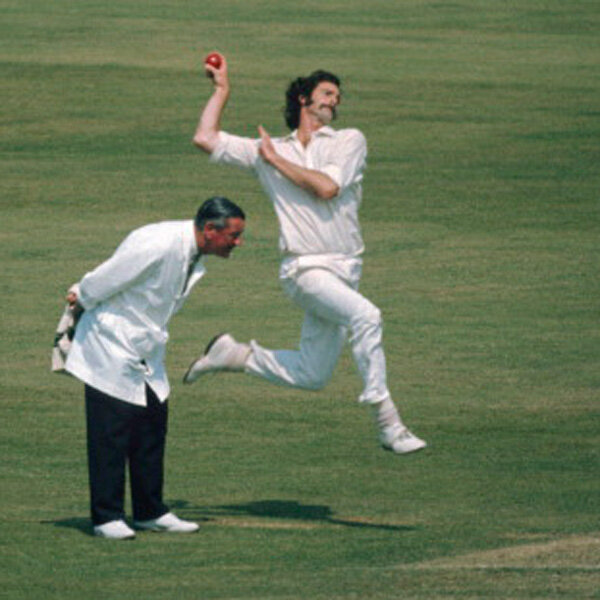by Arunabha Sengupta
It started as raw, volcanic vigour, a fascination for hurling balls down and making them zip across 22-yards in the least possible interval of time.
During the second stage it was hostility laced with skill, a near-perfect weapon of untamed primal force with fast sprouting guile. The flame of aggression singed the best of batsmen, most often burnt them to cinders.
Yet the relentless fire suggested burnout. Something had to give. And his back did. There were an interlude of inaction, frustration and agony.
When he came back, it was as if he had been forged by the scorching travails, the artillery of the past enhanced with science cultivated through months of reflection. The action was remodelled, the hostility remained intact. The offerings were sharpened into cutting edge fast bowling.
Perhaps the greatest of his performances was not one of those many over-recounted over-eulogised vanquishing sagas of the England line up. The plethora of English scribes documenting the game almost always results in the skewing perspective and world-view.
Dennis Lillee was probably at his best when he had returned for the third phase of his career, a veteran pacer, his craft honed by wisdom and experience. That sagacity remained contained in his art, though … the other facets remained unchanged. Be it walking in with the aluminium bat and hurling it past Greg Chappell’s head when asked to use a normal willow; or getting into the most uncouth of brawls with Javed Miandad.
It was this wise, mature Lillee who came up against the battery of West Indian pacers during the Boxing Day Test at Melbourne, 1981. First Test of the series, Lillee on 305 wickets, four shy of Lance Gibbs’s world record.
Holding, Roberts, Garner, Croft. They skittled the Australians for 198, even that total reached only due to sparkling 100 not out by Kim Hughes.
But by stumps on the first day, Lillee had got Haynes caught, trapped nightwatchman Croft leg-before and had knocked back the stumps of Viv Richards for duck. West Indies 10 for 4, Lillee 3 for 1.
The next day morning saw some stubborn resistance by Gomes and Dujon. But Lillee got both. Dujon the compulsive hooker sent an intelligent bouncer to deep square leg where Hughes ran to hold a splendid catch. And then Gomes edged to Greg Chappell at slip and Lillee had the record. For what seemed to be an eternity he stood alone in the middle of the pitch. Teammate after teammate took turns to come over to congratulate him.
He was not done though. Roberts and Garner were added to his victims—the former falling to the famed caught Marsh bowled Lillee combination. That 7 for 83 remained his career best performance and it was not a bad team to have on the receiving end.
He finished with 10 in the match, Australia winning by 58 runs. Lillee providing the almost solo balancing act against the battery of Windies pacemen.
The series ended 1-1. West Indies won the third Test, but only after Lillee snapped his groin in his fifth over. After that it became the one-sided contest that the matches against the 1980s West Indies generally were. Lillee virtually bowled in two Test matches that series and captured 16 wickets at 19.81.
It was that wise Lillee who was perhaps the best of his avatars, when much of the hair was gone, bartered for experience that enhanced his trade into the highest form of art. When the back injuries were buried in the past, when champion sprinter Austin Robertson’s carefully crafted regimen had added years of life to the fast bowler’s career.
As a senior pro he had become the veritable textbook of his profession. Even a phenomenon like Richard Hadlee had a magic formula that spelt his success, a simple question which ran: “What would Lillee do?”
Dennis Lillee’s career evolved through all these phases. It overcame pain, it snipped out the shortcomings to chisel lasting perfection; it won over the inevitable fraying brought about by age. And it ended as one of the most successful of all fast bowling tales in the history of cricket.
What sort of value did he bring?
During his career span, Australia won 31 Tests and lost 16 when he played. When he missed matches, due to back problems or the Packer circus, they won 15 and lost 28.
[Even if we discard the entire Packer period when a lot of stars were absent, and consider the full Australian team during his career… when without Lillee, they won 9 and lost 15.
Dennis Lillee was born on 18 July 1949.

